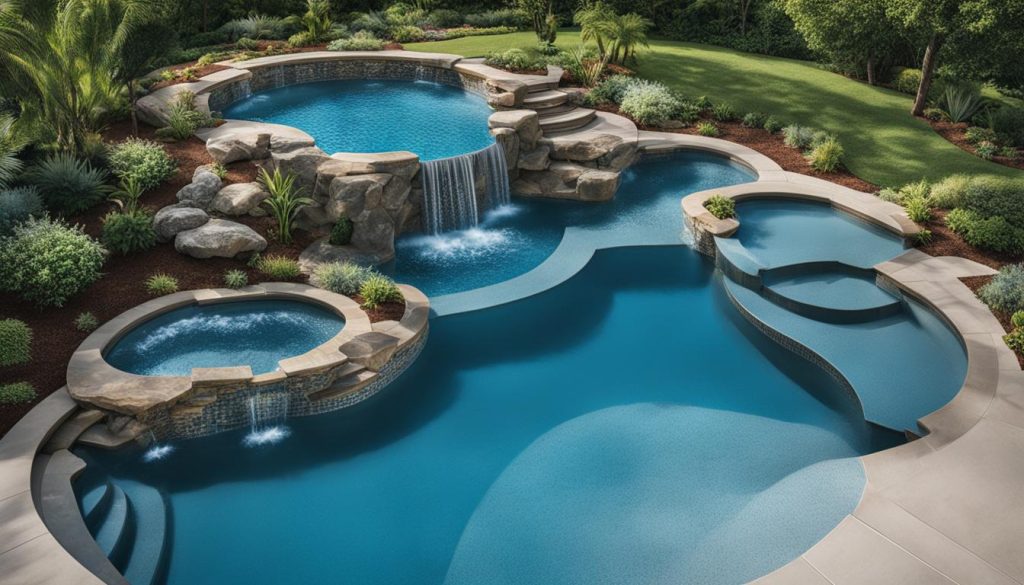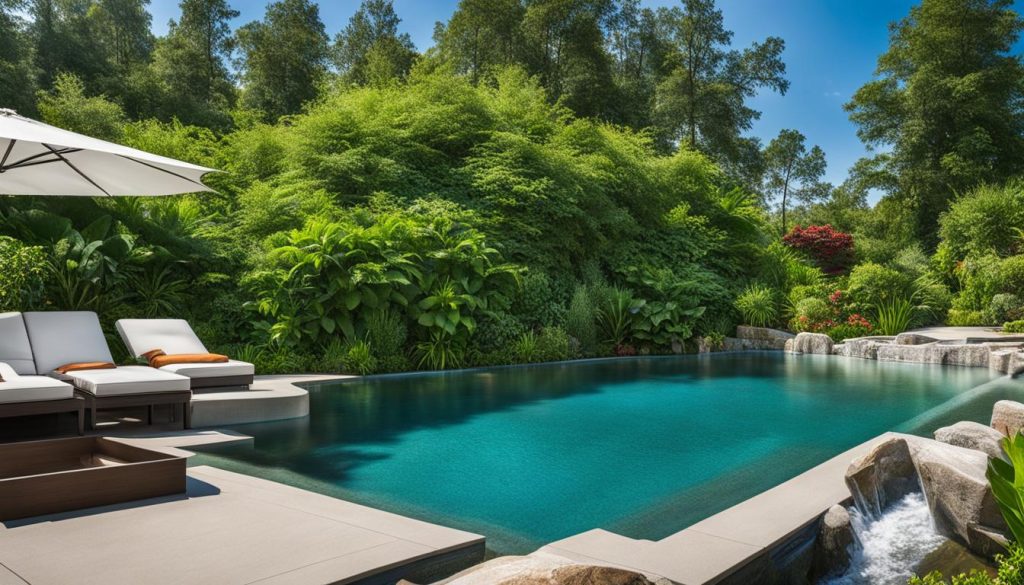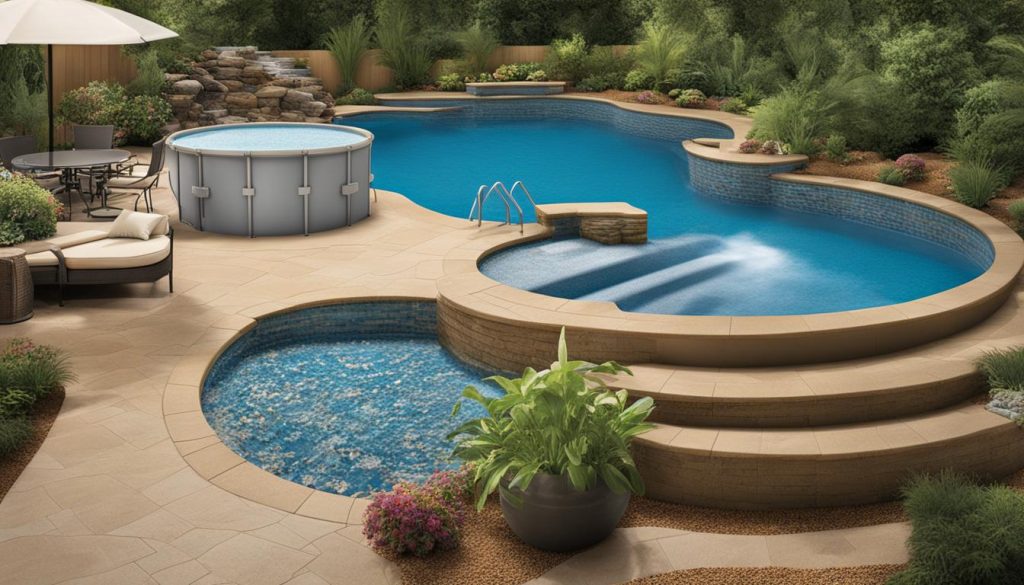Welcome to our comprehensive guide on pool filtration systems. As pool owners, we understand the importance of having clean and safe pool water. A reliable pool filtration system is essential for maintaining optimal water quality. Choosing the right pool filtration system can be overwhelming with the various options available on the market. But worry not, we are here to provide you with the necessary information to make an informed decision.
Pool filtration systems work by removing debris, dirt, and contaminants from the water. A pool’s filtration system is responsible for keeping the water sparkling and transparent. Selecting the right filtration system depends on various factors such as the size of your pool, energy efficiency, and maintenance requirements.
In this article, we will discuss the different types of pool filtration systems available, key factors to consider when making your selection, installation and maintenance tips, and filtration systems suitable for Canadian homes.
Key Takeaways:
- Choosing the right pool filtration system is crucial for maintaining clean and safe pool water.
- There are different types of pool filtration systems available, such as sand filters, cartridge filters, and diatomaceous earth (DE) filters.
- Factors to consider when selecting a filtration system include the size of your pool, maintenance requirements, energy efficiency, and cost-effectiveness.
- Proper installation and maintenance of your pool filtration system will extend its lifespan and ensure optimal performance.
- There are specific pool filtration systems suitable for Canadian homes that consider the unique challenges and needs of Canadian pool owners.
Types of Pool Filtration Systems
When it comes to pool filtration systems, there are three main types to choose from:
| Types of Pool Filtration Systems | Pros | Cons |
|---|---|---|
| Sand Filters | Effective filtering | Require backwashing |
| Cartridge Filters | Low maintenance | Less effective filtering |
| Diatomaceous Earth (DE) Filters | Most effective filtering | Expensive |

Sand filters are the most common type of pool filtration system. They use sand as the filter media to trap dirt and debris. Sand filters are effective, but they require backwashing to clear out the trapped dirt. Cartridge filters, on the other hand, use a replaceable filter cartridge to trap dirt and debris. They are low maintenance but not as effective as sand filters.
The most effective type of pool filtration system is the Diatomaceous Earth (DE) filter. It uses a fine powder made from crushed diatom shells to trap dirt and debris. DE filters provide the most thorough cleaning, but they are also the most expensive.
When selecting a pool filtration system, it’s important to consider the size of your pool, maintenance requirements, and cost-effectiveness. Each type of filtration system has its own pros and cons, and we recommend choosing the one that best suits your particular needs and budget.
Factors to Consider When Choosing a Pool Filtration System
When it comes to choosing a pool filtration system, there are several factors to consider. We understand that it can be overwhelming to navigate through the options, but we are here to help. Here are some essential factors to keep in mind:
Pool Size
The size of your pool is a significant consideration when choosing a filtration system, as it determines the flow rate and filter size needed. A filtration system that is too small for your pool will not be effective in cleaning the water, while one that is too large will be a waste of energy and resources.
Maintenance Requirements
The maintenance requirements of a filtration system should also be taken into account. Some systems require more maintenance than others, and the frequency and complexity of maintenance tasks can vary. For example, sand filters require backwashing to remove debris, while cartridge filters need to be cleaned or replaced regularly.
Energy Efficiency
Energy efficiency is another crucial factor to consider. The type of filtration system you choose can have an impact on your energy bills. For instance, a high-flow filtration system may use more energy than a low-flow one. It’s essential to find a balance between efficiency and effectiveness to achieve optimal results.
Cost-effectiveness
The cost of a filtration system can vary widely, and it’s essential to weigh the initial investment against the long-term benefits. While some systems may have a higher upfront cost, they may save you money in the long run by being more energy-efficient or requiring less maintenance.
Considering all of these factors can help you make an informed decision when choosing a pool filtration system. Our goal is to help you find the system that best suits your needs, so you can enjoy a crystal-clear pool all summer long.
Installation and Maintenance Tips for Pool Filtration Systems
Proper installation and maintenance of your pool filtration system are essential for keeping your pool water crystal clear and safe to swim in. Here are some expert tips to help you get the most out of your pool filtration system:
Installation Tips
First and foremost, it is important to carefully read the manufacturer’s instructions for your specific pool filtration system before beginning installation. This will ensure that you have all the necessary tools and equipment on hand and understand the installation steps.
When installing the filtration system, be sure to place it in a level, stable spot that is close to an electrical outlet. You will also need to connect the plumbing correctly and securely, using the appropriate fittings and sealants to prevent leaks.

It is also crucial to properly prime the pump to ensure it is free of air pockets and can operate efficiently. This involves filling the pump with water before starting it up for the first time.
Maintenance Tips
Regular maintenance of your pool filtration system will help keep it operating at peak efficiency and extend its lifespan. Here are some key maintenance tips to keep in mind:
| Maintenance Task | Frequency |
|---|---|
| Clean the skimmer basket and pump strainer basket | Weekly |
| Backwash the filter | When the pressure gauge reads 8-10 psi above the clean pressure |
| Chemically clean the filter | As needed, per the manufacturer’s instructions |
| Replace filter media (sand, cartridges, DE) | As needed, per the manufacturer’s instructions |
It is also important to regularly test the pool water chemistry to ensure it is balanced and safe to swim in. This will help prevent the buildup of harmful bacteria and algae in the pool. Additionally, be sure to keep the pool area clean and free of debris to minimize strain on the filtration system.
By following these installation and maintenance tips, you can ensure that your pool filtration system operates efficiently and effectively, providing you with crystal clear water all season long.
Pool Filtration Systems for Canadian Homes
In Canada, we are fortunate to have long summers that allow us to enjoy our pools for several months of the year. However, with extreme weather conditions such as cold winters and hot summers, it’s essential to ensure proper filtration and maintenance of your pool to keep the water clean and safe for your family and friends. Let’s look at some of the best pool filtration systems for Canadian homes.
Sand Filter Systems
Sand filter systems are one of the most popular types of pool filtration systems in Canada due to their affordability and ease of maintenance. These systems use sand beds to filter out debris and contaminants from pool water. Sand filters require occasional backwashing to clean out the sand bed and ensure consistent water flow. In areas with hard water, regular cleaning with a filter cleaner will help keep the sand bed in optimal condition.
Cartridge Filter Systems
Cartridge filter systems are another great option for Canadian pool owners. These systems use a pleated cartridge to trap debris and contaminants while allowing water to pass through. Cartridge filters require less maintenance than sand filters and are more energy-efficient, making them an excellent choice for environmentally-conscious homeowners. However, cartridge filters are more expensive upfront, and the cartridges need to be replaced every few years.
Diatomaceous Earth (DE) Filter Systems
DE filter systems are considered the most effective pool filtration systems, capturing even the smallest particles. They use a fine powder made from fossilized diatoms to trap debris and contaminants. DE filters require regular backwashing and the addition of new DE powder to maintain efficiency. These systems are more expensive and require more maintenance than sand and cartridge filters but provide superior filtration.
Choosing the right pool filtration system depends on factors such as the size of your pool, your budget, and your maintenance preferences. For Canadian homes, we recommend sand or cartridge filter systems for their affordability and ease of maintenance. If you want top-notch filtration and don’t mind higher maintenance costs, a DE filter system may be the best option.
Regular maintenance is crucial to keep your pool filtration system running smoothly. In addition to backwashing and filter cleaning, it’s essential to monitor water chemistry, especially in regions with hard water. Consult with a pool professional to determine the best maintenance schedule for your pool.
Investing in a high-quality pool filtration system will ensure your family and friends can enjoy safe and clean pool water all summer long. We hope this guide has helped you choose the right filtration system for your Canadian home.
Our dedicated pool installation professionals specialize in fiberglass, vinyl, or concrete pool installations and are committed to providing exceptional customer service tailored to meet all your needs. Contact Pool Installers today!
FAQ
What types of pool filtration systems are available?
There are three main types of pool filtration systems: sand filters, cartridge filters, and diatomaceous earth (DE) filters. Each system has its own advantages and disadvantages, so it’s important to understand how they work and choose the one that best suits your needs.
How do sand filters work?
Sand filters use a bed of fine sand to trap debris and impurities from the pool water. As the water passes through the sand, small particles are trapped and clean water is returned to the pool. Sand filters require backwashing to remove the trapped debris and maintain efficiency.
What are the pros and cons of cartridge filters?
Cartridge filters consist of a pleated cartridge element that captures debris as water flows through it. They are known for their high filtration efficiency and do not require backwashing. However, cartridge filters may require more frequent cleaning and cartridge replacements compared to other systems.
How do diatomaceous earth (DE) filters work?
DE filters use a powder made from crushed seashells, called diatomaceous earth, as the filtration media. The earth forms a layer on the filter grids and acts as a fine sieve, trapping even the smallest particles. DE filters offer exceptional filtration, but they require regular maintenance and backwashing.
What factors should I consider when choosing a pool filtration system?
When selecting a pool filtration system, consider factors such as the size of your pool, maintenance requirements, energy efficiency, and cost-effectiveness. The size of your pool will determine the flow rate and filter size needed. Maintenance requirements vary for each system, so choose one that aligns with your maintenance capabilities. Energy efficiency and cost-effectiveness are essential for long-term savings.
How do I properly install a pool filtration system?
Proper installation of a pool filtration system is crucial for optimal performance. Follow the manufacturer’s instructions and ensure all connections are secure. It’s important to position the system on a level surface and consider the proper flow direction. If in doubt, consult a professional for assistance.
What are some maintenance tips for pool filtration systems?
Regular maintenance is essential to keep your pool filtration system working efficiently. Clean or replace the filter media as recommended by the manufacturer. Regularly check and clean the filter baskets and backwash the system when necessary. Also, monitor the pressure gauge and ensure proper water chemistry to prolong the lifespan of your filtration system.
Are there any pool filtration systems specifically designed for Canadian homes?
Yes, some pool filtration systems are specifically designed to meet the needs of Canadian homes. These systems often take into consideration the extreme weather conditions and water quality concerns in Canada. Look for systems that are robust, durable, and can handle temperature fluctuations to ensure your pool is ready for the Canadian summers.

